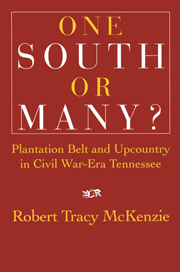Book contents
- Frontmatter
- Contents
- Acknowledgments
- Introduction
- 1 “The Most Honorable Besness in the Country”: Farm Operations at the Close of the Antebellum Era
- 2 “Honest Industry and Good Recompense”: Wealth Distribution and Economic Mobility on the Eve of the Civil War
- 3 “God Only Knows What Will Result from This War”: Wealth Patterns among White Farmers, 1860–1880
- 4 “Change and Uncertainty May Be Anticipated”: Freedmen and the Reorganization of Tennessee Agriculture
- 5 Agricultural Change to 1880
- Conclusion: One South or Many? Implications for the Nineteenth-century South
- Appendix A: Statistical Method and Sampling Technique
- Appendix B: Estimates of the Food Supply and the Extent of Self-sufficiency on Tennessee Farms
- Appendix C: Wholesale Price Data for Agricultural Commodities, 1859–1879
- Index
4 - “Change and Uncertainty May Be Anticipated”: Freedmen and the Reorganization of Tennessee Agriculture
Published online by Cambridge University Press: 06 November 2009
- Frontmatter
- Contents
- Acknowledgments
- Introduction
- 1 “The Most Honorable Besness in the Country”: Farm Operations at the Close of the Antebellum Era
- 2 “Honest Industry and Good Recompense”: Wealth Distribution and Economic Mobility on the Eve of the Civil War
- 3 “God Only Knows What Will Result from This War”: Wealth Patterns among White Farmers, 1860–1880
- 4 “Change and Uncertainty May Be Anticipated”: Freedmen and the Reorganization of Tennessee Agriculture
- 5 Agricultural Change to 1880
- Conclusion: One South or Many? Implications for the Nineteenth-century South
- Appendix A: Statistical Method and Sampling Technique
- Appendix B: Estimates of the Food Supply and the Extent of Self-sufficiency on Tennessee Farms
- Appendix C: Wholesale Price Data for Agricultural Commodities, 1859–1879
- Index
Summary
In an 1883 report to the Tennessee legislature, state commissioner of agriculture Joseph Buckner Killebrew addressed widespread complaints concerning the unreliability of black labor. “Our labor system”, he explained, “as it regards the farm, may be regarded as passing through a transition period, and gradually approaching its permanent condition. Until this is reached, change and uncertainty may be anticipated”. Killebrew made this observation two decades after the Emancipation Proclamation, and, if correct, the commissioner's assessment indicates that “change and uncertainty” were persistent rather than transient features of the postbellum Tennessee countryside, enduring for a generation after the slaves were freed.
Killebrew's conclusion is troubling, for it clashes with basic tenets of the conventional wisdom among scholars in regard to the postbellum transformation of southern agriculture. During the past twenty years, many economists and historians have produced works that examine the social and economic reconstruction of the South and the fate of the freedmen in particular. The account emerging from these studies posits a fleeting transitional period (several years at most) after emancipation – during which new institutions and patterns of behavior were quickly but firmly established – followed by seventy-five years with little change. Agreement is so widespread in regard to basic factual details of the account that a standard scenario is accepted by the majority of scholars. Its fundamental elements are well known and need be reviewed here only briefly.
- Type
- Chapter
- Information
- One South or Many?Plantation Belt and Upcountry in Civil War-Era Tennessee, pp. 121 - 149Publisher: Cambridge University PressPrint publication year: 1994

